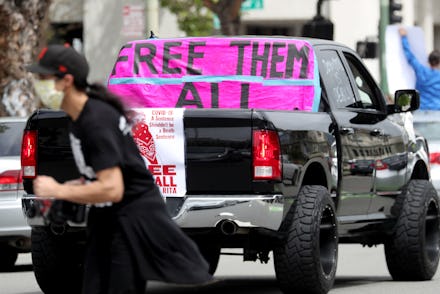A new ACLU study says 100,000 more people could die if prisoners aren't released

As of Wednesday morning, an estimated 45,000 people have died from coronavirus in the United States so far — more people in just a few months than American troops killed in action during the entire Vietnam War. It's a staggering number that is only just beginning to approach the low end of what experts have estimated could be more than 100,000 dead, which itself is a considerable downgrade from earlier models which showed American death tolls in the low millions.
Despite President Trump's morbid declaration that any death toll limited to just 100,000-200,000 people would be a sign of having done a "very good job," a new study from the American Civil Liberties Union suggests that there could be 100,000 more deaths than previously estimated, if something isn't done to address the spread of COVID-19 throughout America's overcrowded penal system. The ACLU conducted the study in conjunction with researchers from Washington State University, the University of Pennsylvania, and the University of Tennessee.
As the ACLU notes in a summary of the study's findings, the spread of the coronavirus within prisons and jails has been "well-documented," and has prompted emergency measures such as mandatory lockdowns and a broader movement to release segments of the prison population to help stem the virus's infection rate. According to their study, however, these existing actions are not nearly enough:
What often gets lost in the discourse is the connection between incarceration facilities and the broader community. Correctional staff come to work every day and then return home. People are frequently brought in on arrest and released if they can pay bail, or held for short stays. Any of these individuals can easily and unknowingly bring the virus into a jail, where infections can spread rapidly. And because of this constant flux of people, more sick people in jail will result in more sick people in the general public.
The solution proposed by the ACLU and its research partners is both radical and entirely pragmatic: a combination of the continued release of prisoners incarcerated for low-level or technical violations, and a reduction in overall arrests along those same lines. Per the study:
If we take action to reduce arrests by 50%, we can save 12,000 lives in jails, and 47,000 lives in the surrounding communities.
If we stop arrests for anything but the 5% of crimes defined as most serious by the FBI — including murder, rape, and aggravated assault — and are able to double the rate of release for those already detained, we can save 23,000 lives in jails, and 76,000 lives in communities.
Indeed, efforts to mitigate the disease's spread in the penal system have even been supported to a degree by Attorney General William Barr, who expanded early release orders for prisoners at a number of facilities facing high infection rates.
A growing number of prosecutors and lawmakers have resisted calls for large-scale prisoner release for non-violent offenders, however. Among them is Nebraska's Republican Gov. Pete Ricketts, who argued that "these are all folks who are there for a reason, and they need to serve out their sentence," even if that sentence is only a matter of months.
As the ACLU notes, addressing coronavirus's spread in the prison system will largely help people of color, who are incarcerated at dramatically higher rates than white people, and for whom the virus has shown to have higher rates of both infection and death.
As things currently stand, the total number of estimated coronavirus-related deaths in the U.S. is likely wildly understated, thanks to a lack of available testing and a surge in at-home deaths in places like New York City. Still, the U.S. is now the global leader in coronavirus deaths. With that in mind, it would be wildly irresponsible for states, and the federal government, not to do everything in their power to possibly help save an estimated 100,000 more people who might otherwise die without immediate action.